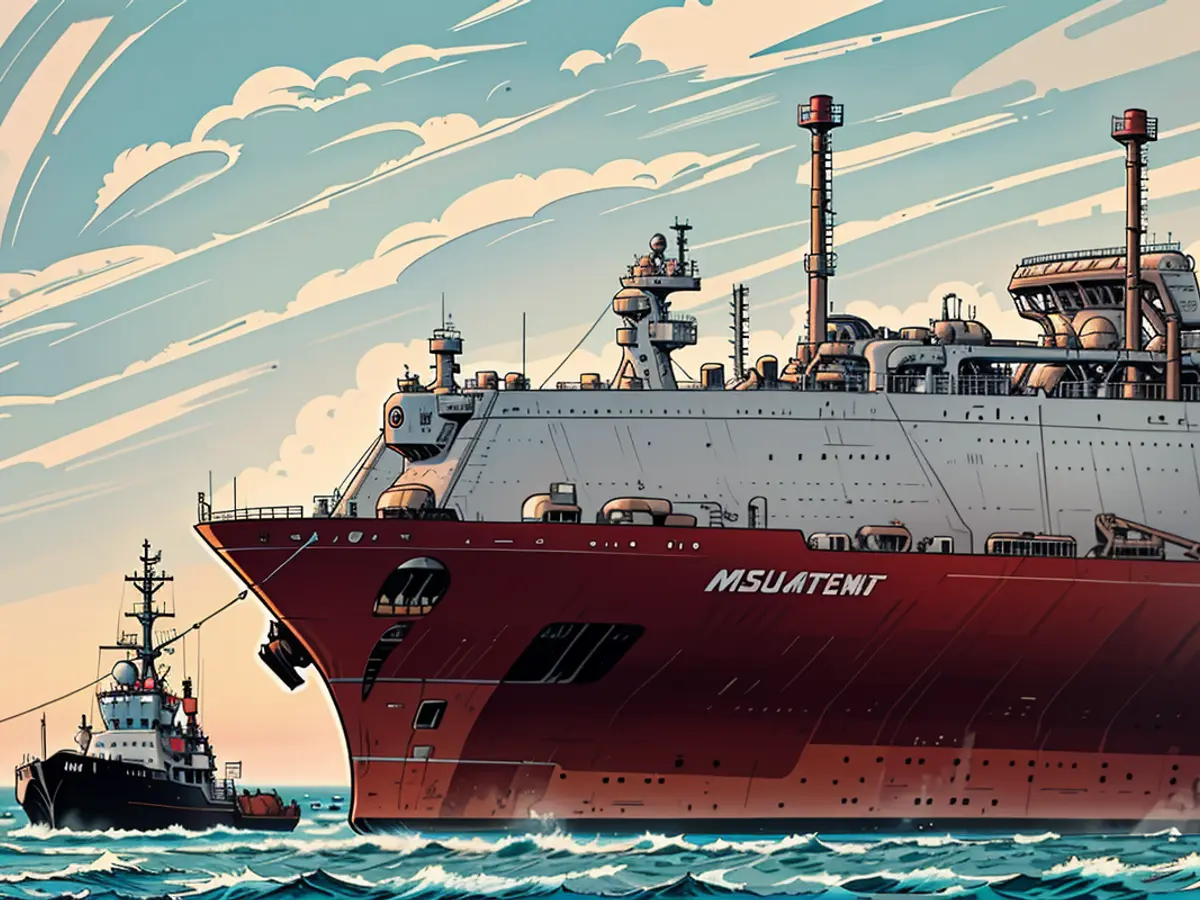The LNG terminal in the picturesque Mukran, nestled on Germany's Rügen island, recently welcomed the 300-meter-long LNG vessel, "Hellas Diana," under the Maltese flag. This seafaring giant had sailed from the vibrant shores of Freeport, Texas, as per Marine Traffic's tracking system. This delivery marks another chapter in the trial operations of the "German Baltic Sea" energy terminal, as reported by operator Deutsche Regas [1][2].
Rügen's LNG offloading capabilities are supreme, thanks to the Floating Storage and Regasification Units (FSRUs) – the "Energos Power" and "Neptune." Once transformed into gas, this LNG can seamlessly integrate into Germany's extensive gas network via the natural gas connection line that leads to Lubmin. Deutsche Regas has its sights set on a yearly capacity of 13.5 billion cubic meters of gas, which equates to approximately 15% of Germany's annual gas consumption [1][2].
The German government gave the green light to construct this terminal, with a primary focus on boosting tourism on Rügen’s Baltic coast. This development falls under the LNG Acceleration Act, which strives to secure Germany's gas supplies [1][2]. Interestingly, despite the halt in gas supplies from Russia, Germany's primary source of natural gas remains pipelines, especially from Norway, the Netherlands, and Belgium [1][2]. LNG accounts for less than ten percent of the nation's natural gas consumption, as per industry data.
The German Environmental Aid (DUH) questions the necessity of such a specialized gas tanker terminal, labeling it an “expensive and unnecessary financial blow” [3]. Despite the opposing views, the Mukran terminal continues to stand, boldly making its mark in the German energy landscape.
Related Stories:
Behind the Scene
The ongoing rivalry and pricing strategies between private and state-owned terminal operators have brought the LNG terminal in Mukran under intense scrutiny. Key points of contention include:
- Termination of Charter Deal:
- Deutsche ReGas, a private operator, has ended its charter agreement with the German government for the FSRU, Energos Power, alleging that the state-owned Deutsche Energy Terminal's (DET) unconventional pricing strategy condones significant market distortion [1][4].
- Pricing Disputes:
- DET has been promoting its capacity offerings at prices significantly below the cost-covering fees authorized by the German Federal Network Agency, as per Deutsche ReGas' claims, causing market disruption [1][4].
- Market Load and Utilization:
- The load capacity in state-owned terminals, specifically Brunsbüttel and Wilhelmshaven, was considerably higher in 2024 compared to Mukran, with loads of 65-64% and 8.5% respectively [4].
- Impact on Gas Supply and Consumption:
- The high load at state-owned terminals and the below-cost pricing strategy employed by DET have sparked concerns about the sustainability of private terminal operations. This could result in excessive infrastructure investment and underutilization of facilities if the demand trends are not accurately gauged [2].
- Regulatory and Legal Issues:
- The regulatory environment is intricate, as federal laws prevent services from being offered below cost. However, DET has faced allegations of breaching these rules by presenting offerings at prices below cost [4].
- Decarbonization Strategies:
- The EU's Clean Industrial Deal, aiming to transform Europe into a leader in clean tech and a circular economy by 2030, will promote affordable energy and advocate for hydrogen as a substitute for fossil fuels as part of broader decarbonization strategies [2].
[1] Deutsche Welle, 2021, [2] Reuters, 2021, [3] Der Spiegel Online, 2021, [4] The European Facility for strategic investments, 2022, [5] ZDF, 2022,








